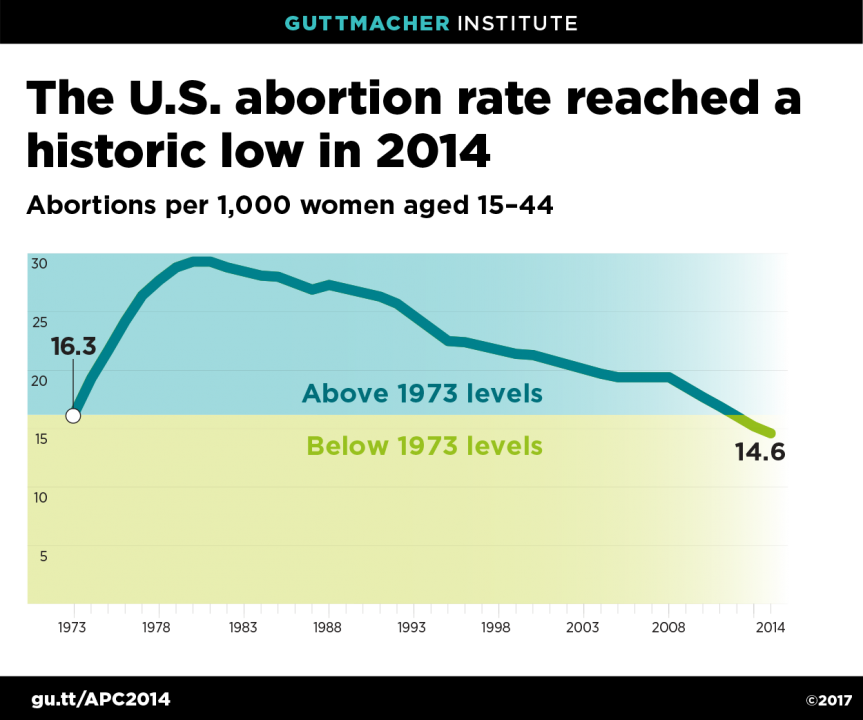Mississippi Bans Abortions After 15 Weeks, Faces First Legal Challenge Today
The nation's most-restrictive law is passed amidst a long-term decline in unwanted pregnancies.
"We are saving more of the unborn than any state in America, and what better thing can we do?"
That's what Mississippi Gov. Phil Bryant said as he signed the nation's strictest law regarding abortion. The only exemptions in House Bill 1510, reports the Clarion Ledger,
are if a fetus has health problems making it "incompatible with life" outside of the womb at full term, or if a pregnant woman's life or a "major bodily function" is threatened by pregnancy. Pregnancies resulting from rape and incest aren't exempted.
Currently, federal law prohibits banning abortions before 20 weeks, which is considered the moment at which a fetus is viable. The law is being challenged by Mississippi's only abortion clinic, the Jackson Women's Health Organization:
Dr. Sacheen Carr-Ellis, in a sworn statement, said she'll have to stop providing abortions to women past the 15 week ban, or else lose her Mississippi medical license, as House Bill 1510 requires. Carr-Ellis said women shouldn't be forced to carry their pregnancies to term against their wills or leave the state to obtain abortions.
"A woman who is pregnant should have the ability to make the decision that is best for her about the course of her pregnancy, based on her own values and goals for her life," Carr-Ellis said in the statement.
I realize and respect that some libertarians are opposed to abortion except when a pregnant woman's life is endangered by bringing the pregnancy to term.
But Carr-Ellis's perspective seems right to me, especially before viability. Personhood is a legal concept, not a scientific fact, and will always be subject to definition and redefinition as our knowledge and morality change. But despite some ambiguity, viability has a strong claim as being the moment at which personhood should be granted and the state can rightly begin to take some interest, with interventions becoming more likely as the pregnancy continues. This is roughly the thinking behind Roe v. Wade (1973), which has been revised and amended in subsequent rulings by the Supreme Court, and it also accords well with public opinion on abortion. By a two-to-one margin (61 percent to 31 percent), Americans support unfettered rights to an abortion in the first trimester of a pregnancy but that position reverses in the second trimester (27 percent to 64 percent) and drops further in the final trimester (14 percent to 80 percent). That pattern is reflected in when women have abortions, too, with 95 percent of abortions taking place by week 15. In Mississippi, just "78 abortions in 2017 [were performed] when the fetus was identified as being 15 weeks or older. That's out of about 2,500 abortions performed statewide, mostly at the clinic."

Granting pre-viability fetuses full legal rights from the "moment of conception," the stated goal of many if not most abortion opponents, is imprecise and opens up our private lives to all sorts of invasive state interventions. For instance, prior to the new law, Mississippi counted a pregnancy as beginning with the first day of a woman's last menstrual cycle, or about two weeks before most other states started counting. So even though Mississippi's previous ban on abortions started after 20 weeks, it effectively meant it started at 18 weeks by the methods used in other places. Beyond that, there is a serious question of how to account for naturally occurring abortions. "Embryologists estimate that the rate of natural loss for embryos that have developed for seven days or more is 60 percent," notes Reason's Science Correspondent Ronald Bailey. "The total rate of natural loss of human embryos increases to at least 80 percent if one counts from the moment of conception." If "moment of conception" becomes the legal definition, then what is to be done about the millions of "deaths" that occur every year?
In any case, the rate of abortions per 1,000 women aged 15 years to 44 years has declined below what it was when Roe v. Wade was decided in 1973. Better contraceptives and more access to them is the leading cause of the reduction, as the incidence of unwanted pregnancy is way down across all age groups. It's also likely that increasingly tighter state-level restrictions and the reduction in the number of abortion providers plays a role, too, though given that only 1.3 percent of abortions are performed after 20 weeks, the legal cut-off in most states, it's not clear how much impact such restrictions have. Prior to the Supreme Court legalizing the procedure, it's estimated that between 200,000 and 1.2 million abortions were performed per year, with most of them being illegal.
The first challenge to Mississippi's new law comes today, with a federal judge hearing arguments for and against blocking the implementation of the 15-week ban as its constitutionality is tested in the courts.
In 2013, Reason held a discussion about "Abortion & Libertarians" featuring Katherine Mangu-Ward, Ronald Bailey, and The Federalist's Mollie Hemingway. Take a look:


Show Comments (215)